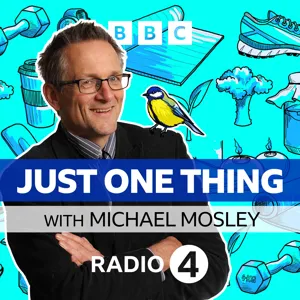Podcast Summary
Exploring Authentic Connections Through Unique Conversations and Simple Practices: Embrace authenticity in conversations and try reading poetry out loud for improved mental health, relaxation, and potential new ways to connect with oneself.
Finding genuine connections, whether in relationships or personal growth, requires authenticity and effort. In the realm of dating, eharmony encourages unique conversations by disallowing copy-paste messages. Similarly, when it comes to improving our health, simple yet effective practices like reading poetry out loud can have profound impacts on mental health and relaxation. During a rainy afternoon, Doctor Michael Mosley, the host of BBC World Service's "Just One Thing," emphasizes the importance of poetry in our lives. Poetry not only takes us out of ourselves but also helps us express emotions and cope with stress and loneliness. Research shows that reading poetry out loud can even activate our body's rest and repair response. Colm, a software engineer in Manchester, shares his experience of managing a busy routine and dealing with anxiety. He primarily relies on physical activity to relax. However, after considering Doctor Mosley's suggestion, Colm decides to explore the world of poetry and potentially discover new ways to unwind and connect with himself. In summary, embracing authenticity in our conversations and pursuing simple yet effective practices like reading poetry can lead to meaningful connections and improvements in both our relationships and personal well-being.
Poetry and Mental Health: Reading and reciting poetry, especially out loud, can reduce anxiety, depression, loneliness, and increase hope and energy levels, triggering the body's natural relaxation response.
Reading and reciting poetry, especially out loud, can have positive effects on mental health and emotional well-being. Poetry has been used as a form of therapy for centuries, dating back to ancient Egyptian times when words were dissolved in water and consumed as medicine. Modern studies suggest that engaging with poetry can help reduce feelings of anxiety, depression, and loneliness, and even increase hope and energy levels. Additionally, reading poetry out loud can trigger the body's natural relaxation response, which can lead to lower heart rate, blood pressure, and improved mood. So, incorporating just five minutes of poetry reading and recitation into your daily routine could have significant benefits for your overall well-being.
Reading poetry out loud can improve well-being: Reading poetry aloud, especially in hexameter verse, activates relaxation response, lowers stress, regulates immune system, and enhances mood and quality of life.
Reading poetry out loud, particularly in hexameter verse, can have profound effects on our relaxation response and overall well-being. Colm's personal experience of reading Irish poetry by Seamus Heaney and finding relaxation in the practice aligns with the scientific findings. Dietrich von Bonin, from the Swiss Association of Art Therapies, shared research showing that reading poetry aloud can help switch off stress responses, lower blood pressure, regulate the immune system, and improve mood and quality of life. This occurs through activation of the parasympathetic nervous system, which can lead to a deep sense of peace and increased heart rate variability. A study conducted by Dietrich and his team revealed that reading poetry out loud, specifically hexameter verse, had a stronger synchronizing effect on breathing rhythm and heart rate variability compared to paced breathing. Hexameter verse, commonly found in Greek and Latin poetry, involves a rhythmic pattern of six syllables per line. Overall, incorporating poetry reading into our daily routine, particularly out loud, can be an effective and enjoyable way to activate our relaxation response and promote overall well-being.
Reading rhythmical poetry before bedtime enhances relaxation and sleep quality: Reading poetry out loud for 5-20 minutes before bed activates the relaxation response, reduces stress, and improves sleep quality through the parasympathetic nervous system and emotional engagement.
Engaging with rhythmical poetry before bedtime can significantly enhance your relaxation response and improve the quality of your sleep. The regular sequence of stressed and unstressed syllables in poetry forms a flow of breath, making you breathe out for three times longer than you breathe in. This activates the parasympathetic nervous system, which is responsible for the relaxation response. Moreover, the emotional content of poetry adds to the satisfaction and joy, helping you maintain the practice for a more extended period. The practice of reading poetry out loud can be a simple yet powerful habit to reduce stress and anxiety. While 20 minutes of practice has been found effective in studies, noticeable improvements can be observed after just 5 minutes. For lasting benefits, it is recommended to practice three to four times a week for about a month. So, consider incorporating rhythmical poetry into your bedtime routine to unwind and rejuvenate.
Exploring new experiences can lead to positive changes: Incorporating new art, creativity, food, or personal growth experiences can improve brainpower, reverse aging signs, and enhance overall well-being. Try new things on 'Just One Thing' on BBC Sounds or HelloFresh for delicious meals.
Incorporating new experiences into our lives, whether it's through art, creativity, or trying new things, can have profound benefits. On the latest episode of "Just One Thing" on BBC Sounds, guests like Nick Cave, Stephen Fry, Margaret Atwood, and Paul McCartney shared how their inspirations and experiences shaped their work. Meanwhile, in a different vein, listeners might find themselves longing for culinary inspiration and variety in their meals. Enter HelloFresh, a solution that delivers delicious, easy-to-prepare meals right to your door. The episode also touched on the importance of self-care and nourishment, both physically and creatively. So, whether it's through art, food, or personal growth, remember that trying new things can lead to positive changes in your life. If you're intrigued by the idea of boosting your brainpower through yoga or reversing signs of aging, be sure to subscribe to "Just One Thing" on BBC Sounds for more insights. And for those seeking to spice up their dinner routine, give HelloFresh a try at hellofresh.com.

